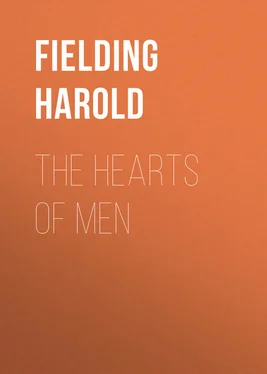Harold Fielding - The Hearts of Men
Здесь есть возможность читать онлайн «Harold Fielding - The Hearts of Men» — ознакомительный отрывок электронной книги совершенно бесплатно, а после прочтения отрывка купить полную версию. В некоторых случаях можно слушать аудио, скачать через торрент в формате fb2 и присутствует краткое содержание. Жанр: foreign_antique, foreign_prose, на английском языке. Описание произведения, (предисловие) а так же отзывы посетителей доступны на портале библиотеки ЛибКат.
- Название:The Hearts of Men
- Автор:
- Жанр:
- Год:неизвестен
- ISBN:нет данных
- Рейтинг книги:3 / 5. Голосов: 1
-
Избранное:Добавить в избранное
- Отзывы:
-
Ваша оценка:
- 60
- 1
- 2
- 3
- 4
- 5
The Hearts of Men: краткое содержание, описание и аннотация
Предлагаем к чтению аннотацию, описание, краткое содержание или предисловие (зависит от того, что написал сам автор книги «The Hearts of Men»). Если вы не нашли необходимую информацию о книге — напишите в комментариях, мы постараемся отыскать её.
The Hearts of Men — читать онлайн ознакомительный отрывок
Ниже представлен текст книги, разбитый по страницам. Система сохранения места последней прочитанной страницы, позволяет с удобством читать онлайн бесплатно книгу «The Hearts of Men», без необходимости каждый раз заново искать на чём Вы остановились. Поставьте закладку, и сможете в любой момент перейти на страницу, на которой закончили чтение.
Интервал:
Закладка:
"I went," thought the boy, "to these theological scientists, for help in my everyday life, for clear directions and explanations, and what do they give me? A mass of words meaning nothing, words and words, and tangled thoughts; evasion and misrepresentation, misty dreams and cloud-hidden ideals. They cannot explain, and therefore the whole thing is false. There is no truth anywhere in it. The whole teaching of the Bible, from the Creation down to the incarnation of Christ and His second coming, is one huge mistake. Why people keep on believing it I cannot say. But anyhow I have found out its falseness, and I will not. Let it all go. It will make no difference and be rather an advantage. What use have I ever had from this religion that has been dinned into me? It gave me false ideas of the world and nature which I have had to unlearn. It gave me an unworkable code of conduct which I never tried to follow, but I got into trouble for it. To call oneself a Christian is merely a way of talking. No one is so really, and the only difference between me and the others will be that while they are not Christians but think they are, I am not a Christian and know I am not."
Was the boy glad or sorry? I do not know. I think perhaps he was both. He felt like a man who has shaken off a burden, a load that contained mere weight and no useful thing. He would step more lightly in future.
But he felt, too, like a man who has skirted a precipice, secure in that a railing fenced him in from danger, when he suddenly discovers that the railing is decayed to the core and will vanish at a touch. He felt dizzy and afraid, and the feeling grew upon him.
May be, he thought, it is a good thing to have a religion. People of all faiths, of all nations, seem to cling to theirs very strongly. It is the one thing they cannot bear to lose. Yet I do not know what they get from it. At least I do not know what people get from Christianity. What I look for in a faith are these three things.
I wish an explanation of my origin, of the origin of man and his relation to this world, and to what there may be beyond this world. I want an explanation I can accept, and that is not contradicted by the knowledge we acquire from other sources than religion.
And I want a guide to life. I want a guide to life as it is. For I have to live in the world as it exists, and I would have help and direction to do so well. I want a teaching and an example I can refer to in my everyday troubles.
Finally, I would know something of the Hereafter. I would desire to hear of the after death. I cannot believe that all non-Christians, including myself and the majority of Christians, go to hell. That is repulsive. Nor can I believe in the heavens they tell us of. If all be true that they tell us, it has no attraction this Christian heaven. To be for ever singing praises is not life but monotony. Did any man in health, and strength, and sanity ever yearn to die in order to reach this Heaven they tell us of? Did not Aucassin say long ago that if he were to believe the monks Heaven was a place for the poor and maimed, the foolish, the childish and silly, the stupid, the cowards, the ugly, the undesirable, the failures of earth, and that he cared not for it? Whoever was unfit for earth was the more fit for heaven. No! If there is another world it must be different from the conceptions of Heaven and Hell as are taught. And I would know. These seem to me the essentials of religion. They are the three things I want. I have not found them. It may be that in the other greater faiths that hold the world I may find what I seek. I cannot say. But meanwhile I must do without. It is better to have no compass than a faulty one. It is better to watch for the stars, even if the night be thick and it be hard to see.
Such, I think, was what he thought. Whether he ever found what he sought, whether any faith can give what he asks, whether indeed these three things are essentials of religion at all, will be found in the latter part of the book. This part is but the introduction to explain why and by whom the search was made, and what was sought.
CHAPTER VI
WHENCE FAITHS COME
From the East has come all our light. All world religions have begun there, have grown there, have mostly spread there.
Brahminism and Buddhism, Judaism and Christianity, Mahommedanism and Parseeism, the cult of the Taoists and Confucians, every belief that has been a great belief, that has led man captive, has come from the East. Even the Mythologies of Greece and Rome were from Asiatic sources, from Babylon and Chaldea. In the North we have originated only Thor and Odin, Balder and the Valkyries.
I do not think anyone who has lived in the East can doubt why this has been so. Where is it man's thoughts are deepest and strongest, where is it that his heart responds to the heart of the world until they beat throb for throb?
It is never in the North; for the cold winds and dreary skies, the rain and cloud and gloom, do not draw a man out from himself, but drive him in. Every keen breeze that blows, every shower, every grey day, reminds him not of his soul but of his body. It must be kept warm, it must be fed, it must be housed. He cannot forget that the outside world must be guarded against, is an enemy to be feared.
And man must live in houses with other people. He cannot be alone, he cannot ever feel alone with just himself and the world. Yet it is only in solitude, when alone with Nature, that she will talk to you. For her voice is very low, and there must be a great silence before she will tell her secrets.
But there in the East it is not so. For weeks and months, for half the year may be, one perfect day is joined to another by more perfect nights.
Only there can man be alone. Only there, in the limitless silence of the desert, in the unending forests, can you live and forget all other men, and yourself almost, and be alone with Him who is God.
You want but little, no house to shelter you, no fire, but very little food and drink and clothes. You do not feel that restless desire to do something born of cold winds and skies. Your roof by day is the palm or tamarind, by night you watch the stars wheeling over your head. There is no one to commune with but Nature, and if you love her as she should be loved; if you woo her as she would be wooed; if you can send out your soul to lose itself with her in the wonders of the infinite, then shall you hear the music of the stars.
Thus has all religion come from the land of the sun: light is the fount of faith.
Never till you have been to the East can you know what faith is. Have we not religion, nay religions, in the North? Yes, but not as they have there. Do we not believe in the West? Yes, but not as they believe. Faith lies there in the great distances, in the dawn, the noon, the sunset, in the holiness of the dark. It has sunk into the heart of man. Consider, what do you see when you land anywhere in the East, what strikes you most, what is most prominent, not in the landscape, but in the people?
It is their religion.
You watch the people in the streets and you ask, Why has the merchant in that shop trident marks on his forehead? Because he is a Hindu and follows Vishnu. And that clerk who gave me money in the bank, why has he those other marks? Because he is a Brahmin. And that money-lender seems to have rubbed his forehead with ashes? He is a Chetty.
They carry their religion about with them, they are proud of it, they desire all men to know it. See that man's beard, he is a Mahommedan; and yonder man with a green turban, he is a Seyid. They would not desire you to doubt it.
Did you ever see Englishmen praying in the streets? Perhaps never. Certainly if ever you have seen it you condemned it as unnatural. "Let him pray at home," you have thought. "He is parading his piety." But here in the East it is different.
Читать дальшеИнтервал:
Закладка:
Похожие книги на «The Hearts of Men»
Представляем Вашему вниманию похожие книги на «The Hearts of Men» списком для выбора. Мы отобрали схожую по названию и смыслу литературу в надежде предоставить читателям больше вариантов отыскать новые, интересные, ещё непрочитанные произведения.
Обсуждение, отзывы о книге «The Hearts of Men» и просто собственные мнения читателей. Оставьте ваши комментарии, напишите, что Вы думаете о произведении, его смысле или главных героях. Укажите что конкретно понравилось, а что нет, и почему Вы так считаете.












